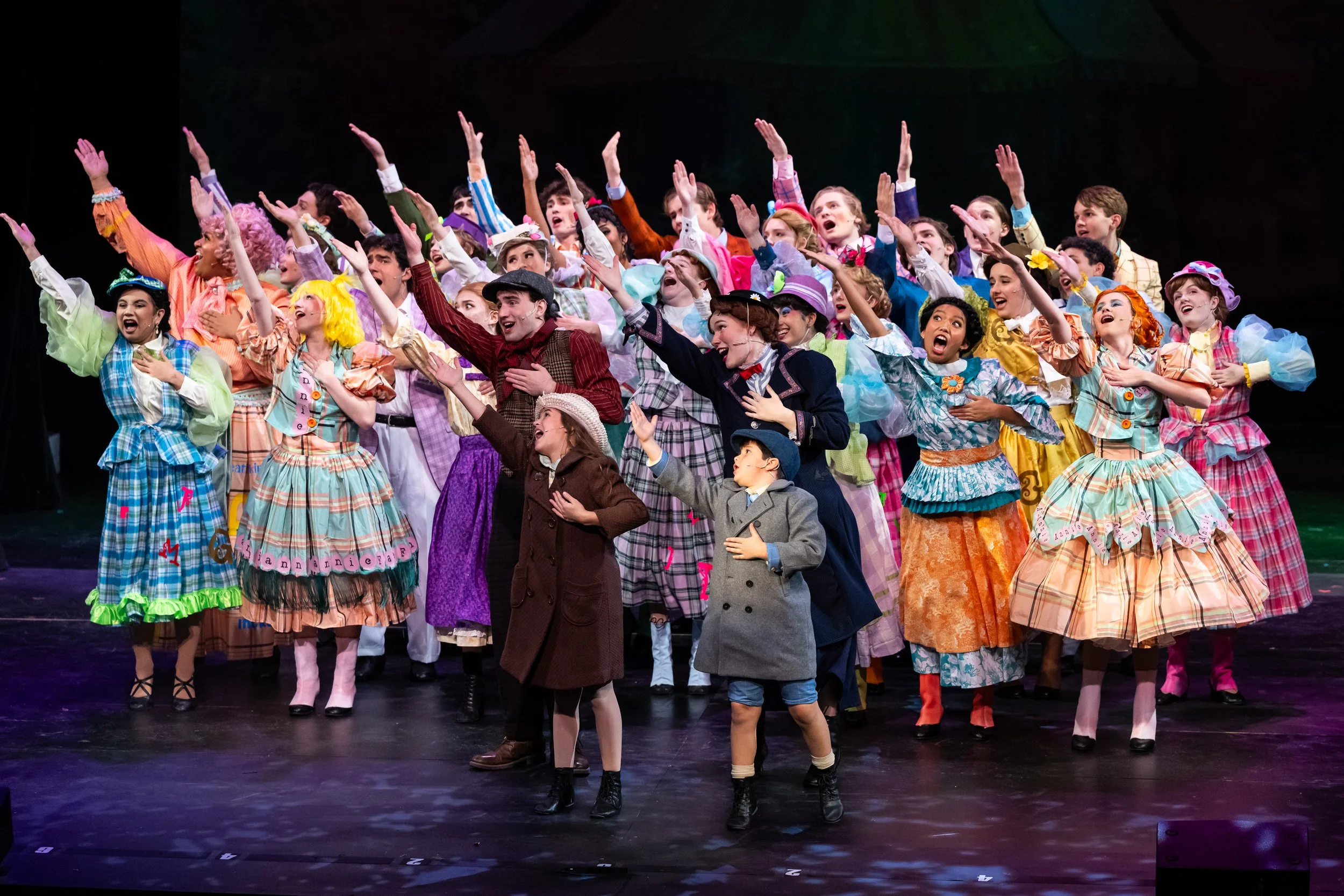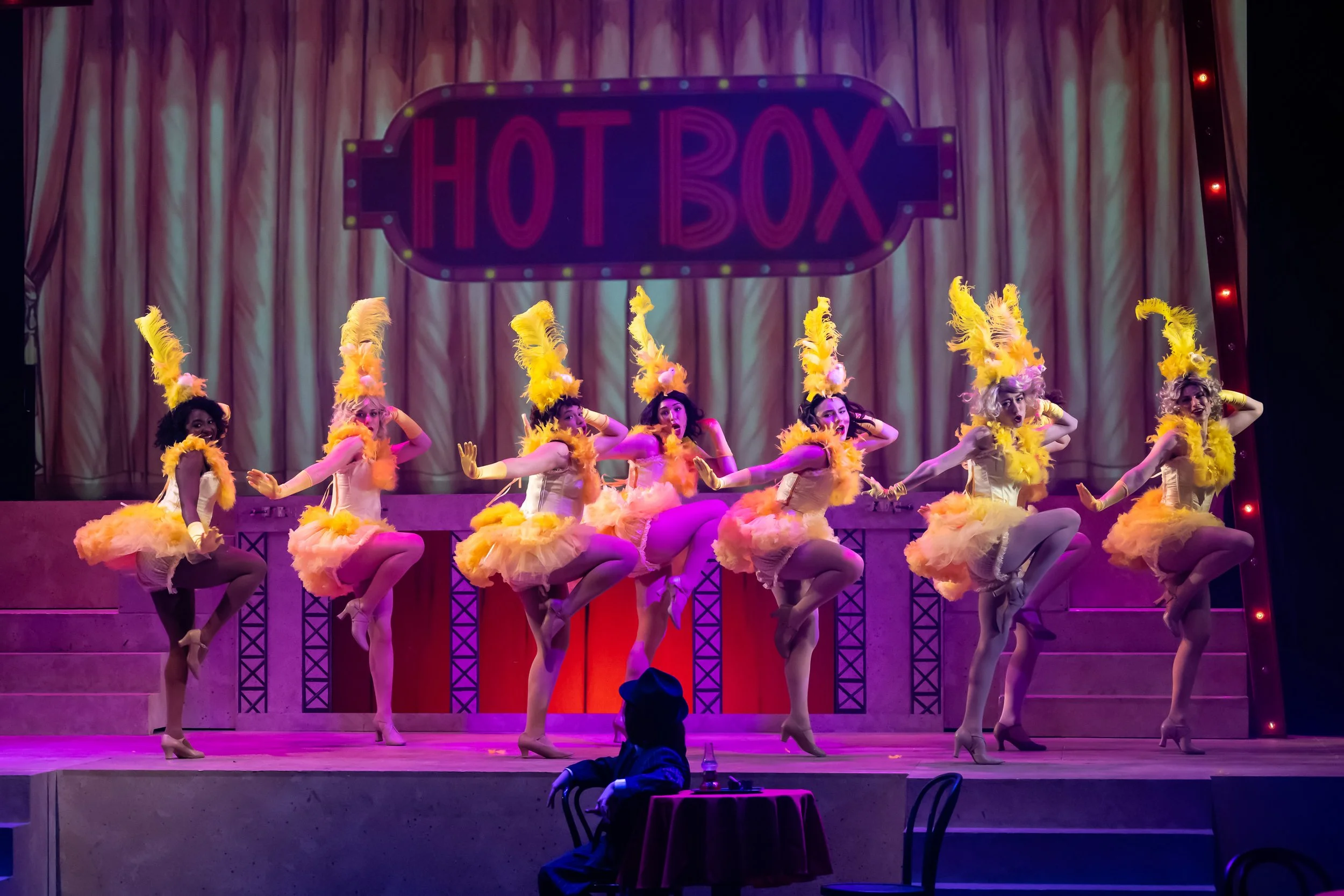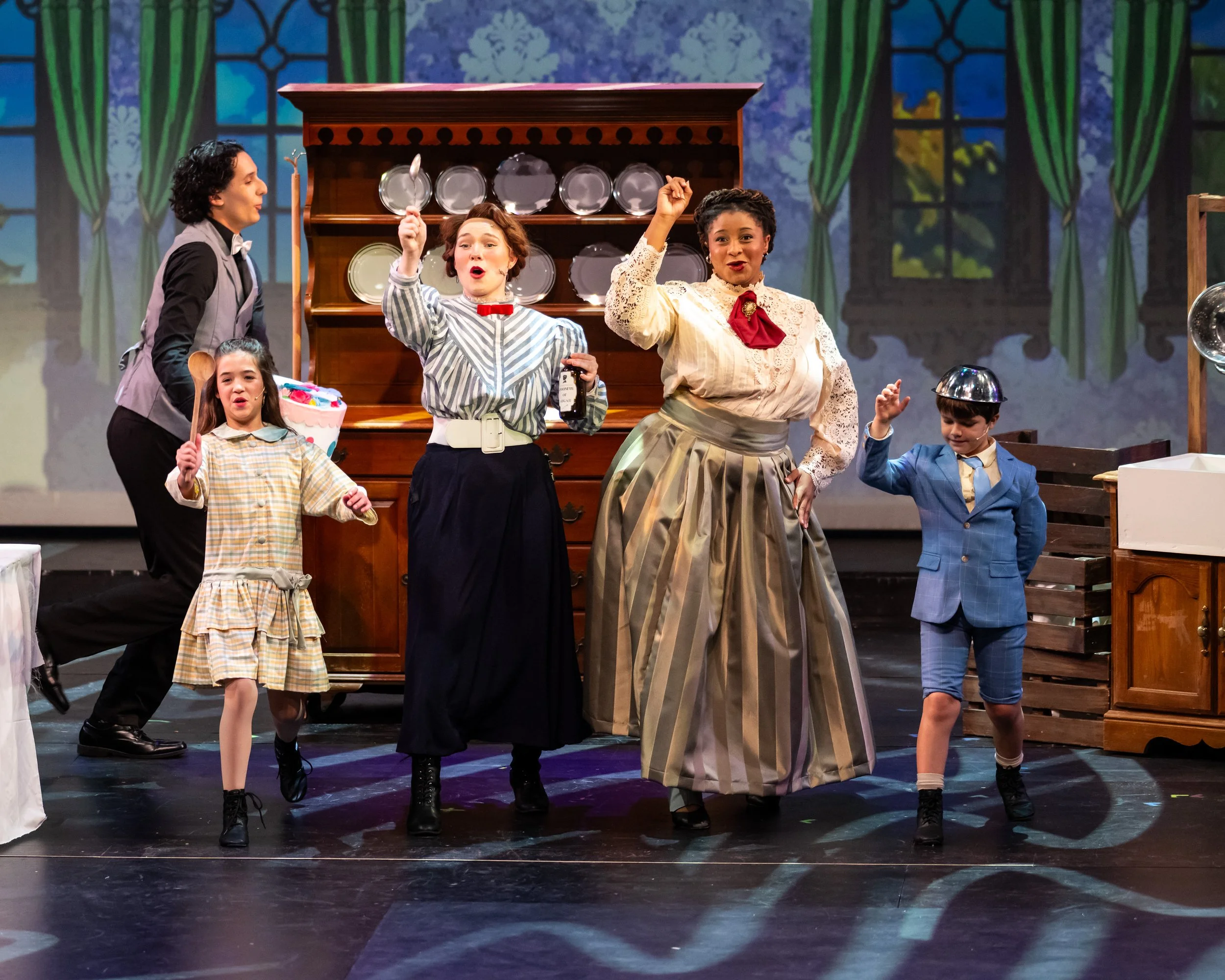
SUMMER STOCK AUSTIN PERFORMERS
In the audition form, you will be asked to submit the following:
(Regarldless if you are submitting virtually or in-person)
• A Headshot (or recent photo)
• Your Resume
• Two references (contacts)
• Some video uploads
PERFORMER OPTIONS
You can audition as ONE of the following:
FULL AUDITION:
-
-TWO (2) CONTRASTING SONGS (Required): 60-90 seconds of a musical theatre song. Be sure to submit two contrasting songs.
-SONG 3 (Optional): 60-90 seconds of a song that best shows your unique vocal style and personality. Be sure it is contrasting to your first 2 selections. Sing something that reflects your enthusiasm/passion!
What do we mean by “contrasting?”
By presenting these two contrasting songs in an audition, a performer can demonstrate a wide range of emotional depth, vocal skills, and adaptability to different musical styles and character personas.
Style and Tone
Example: An emotional ballad versus an upbeat showstopper
Example: A classical era song versus a contemporary song
Example: An upbeat song versus a ballad
Character and Context
Example: A song reflecting hope and desperation versus a Declaration of Independence and self-confidence
Vocal Range and Technique
Example: Shows strong upper range, with a focus on head voice and controlled dynamics versus demands a strong belt, with a focus on chest voice and powerful, sustained notes.
-
-DANCE 1 (Required): Carrying The Banner - learn from the teach-through video and film yourself performing the combo. Pay attention to style and storytelling.
-DANCE 2 (Required): Where The Family Goes learn from the teach-through video and film yourself performing the combo. Pay attention to style and storytelling.
All dance resources can be found here!
-DANCE 3 (Optional): Ballet (strongly suggest this if you enjoy dancing) If you have formal ballet dance training, please submit video of a ballet combo or series you know or have prepared. (Under 60 seconds)
DANCE 4 (Optional): Tap If you don’t have formal tap dance training, we have a short combo you may learn and submit.
-DANCE 5 (Optional): Please provide any additional skills you may have.
Example of acceptable skills (not limited to this list):
Turns (Double or triple pirouette, Turns in second, Barrel turns, others of your choosing)
Leaps (Jeté, Saut de chat, Switch leap, Leaps in second, Axel jump, Toe touches, Leaps of any kind)
Kicks (High kicks, fan kicks, layout)
Kip up
Tumbling (Anything more advanced than a round off)
Tap - Time steps, Pull backs, Cramp rolls, Wings
-
-MONOLOGUE 1 (Required): A contemporary monologue (60-90 seconds) from a published play. No Shakespeare. Choose something that shows a role you could actually play.
-MONOLOGUE 2 (Optional): A contrasting monologue (60-90 seconds) from a published play. Only add this one if you need an additional monologue to show the versatility of style, emotions, character, etc.
-
We wanna get to know you!
-TELL US A STORY (Required): It can be about anything… a funny story about your family, a touching story about a teacher, a silly story about your friends, just tell us a story. (60-90 seconds)
-STATEMENT OF PURPOSE (Required): Why do you want to participate this summer? What would you bring to the program? What do you hope to gain/learn this summer? Do you have any specific interests? (60-90 seconds)
DANCER/ENSEMBLE AUDITION:
-
-ONE (1) SONG (Required): 60-90 seconds of a musical theatre song that best shows your unique vocal style and personality. Sing something that reflects your enthusiasm/passion!
-ADDITIONAL SONG(S) (Optional) : 60-90 seconds of one or two additional songs. Be sure any additional songs are contrasting to your first selection.
What do we mean by “contrasting?”
By presenting these two contrasting songs in an audition, a performer can demonstrate a wide range of emotional depth, vocal skills, and adaptability to different musical styles and character personas.
Style and Tone
Example: An emotional ballad versus an upbeat showstopper
Example: A classical era song versus a contemporary song
Example: An upbeat song versus a ballad
Character and Context
Example: A song reflecting hope and desperation versus a Declaration of Independence and self-confidence
Vocal Range and Technique
Example: Shows strong upper range, with a focus on head voice and controlled dynamics versus demands a strong belt, with a focus on chest voice and powerful, sustained notes.
-
-DANCE 1 (Required): Carrying The Banner - learn from the teach-through video and film yourself performing the combo. Pay attention to style and storytelling.
-DANCE 2 (Required): Where The Family Goes learn from the teach-through video and film yourself performing the combo. Pay attention to style and storytelling.
All dance resources can be found here!
-DANCE 3 (Required): Ballet If you have formal ballet dance training, please submit video of a ballet combo or series you know or have prepared. (Under 60 seconds)
DANCE 4 (Optional): Tap If you don’t have formal tap dance training, we have a short combo you may learn and submit.
-DANCE 5 (Required): Please provide any additional skills you may have.
Example of acceptable skills (not limited to this list):
Turns (Double or triple pirouette, Turns in second, Barrel turns, others of your choosing)
Leaps (Jeté, Saut de chat, Switch leap, Leaps in second, Axel jump, Toe touches, Leaps of any kind)
Kicks (High kicks, fan kicks, layout)
Kip up
Tumbling (Anything more advanced than a round off)
Tap - Time steps, Pull backs, Cramp rolls, Wings
-
-MONOLOGUE 1: A contemporary monologue (60-90 seconds) from a published play. No Shakespeare. Choose something that shows a role you could actually play.
-MONOLOGUE 2: A contrasting monologue (60-90 seconds) from a published play. Only add this one if you need an additional monologue to show the versatility of style, emotions, character, etc.
-
We wanna get to know you!
-TELL US A STORY (Required): It can be about anything… a funny story about your family, a touching story about a teacher, a silly story about your friends, just tell us a story. (60-90 seconds)
-STATEMENT OF PURPOSE (Required): Why do you want to participate this summer? What would you bring to the program? What do you hope to gain/learn this summer? Do you have any specific interests? (60-90 seconds)
MOVER AUDITION:
-
-TWO (2) CONTRASTING SONGS (Required): 60-90 seconds of a musical theatre song. Be sure to submit two contrasting songs.
-SONG 3 (Recommended): 60-90 seconds of a song that best shows your unique vocal style and personality. Be sure it is contrasting to your first 2 selections. Sing something that reflects your enthusiasm/passion!
What do we mean by “contrasting?”
By presenting these two contrasting songs in an audition, a performer can demonstrate a wide range of emotional depth, vocal skills, and adaptability to different musical styles and character personas.
Style and Tone
Example: An emotional ballad versus an upbeat showstopper
Example: A classical era song versus a contemporary song
Example: An upbeat song versus a ballad
Character and Context
Example: A song reflecting hope and desperation versus a Declaration of Independence and self-confidence
Vocal Range and Technique
Example: Shows strong upper range, with a focus on head voice and controlled dynamics versus demands a strong belt, with a focus on chest voice and powerful, sustained notes.
-
Choose Dance 1 or Dance 2
-DANCE 1 Carrying The Banner - learn from the teach-through video and film yourself performing the combo. Pay attention to style and storytelling.
-DANCE 2 Where The Family Goes learn from the teach-through video and film yourself performing the combo. Pay attention to style and storytelling.
All dance resources can be found here!
-DANCE 3 (Optional): Ballet If you have formal ballet dance training, please submit video of a ballet combo or series you know or have prepared. (Under 60 seconds)
DANCE 4 (Optional): Tap If you don’t have formal tap dance training, we have a short combo you may learn and submit.
-DANCE 5 (Optional): Please provide any additional skills you may have.
Example of acceptable skills (not limited to this list):
Turns (Double or triple pirouette, Turns in second, Barrel turns, others of your choosing)
Leaps (Jeté, Saut de chat, Switch leap, Leaps in second, Axel jump, Toe touches, Leaps of any kind)
Kicks (High kicks, fan kicks, layout)
Kip up
Tumbling (Anything more advanced than a round off)
Tap - Time steps, Pull backs, Cramp rolls, Wings
-
-MONOLOGUE 1 (Required): A contemporary monologue (60-90 seconds) from a published play. No Shakespeare. Choose something that shows a role you could actually play.
-MONOLOGUE 2 (Optional): A contrasting monologue (60-90 seconds) from a published play. Only add this one if you need an additional monologue to show the versatility of style, emotions, character, etc.
-
We wanna get to know you!
-TELL US A STORY (Required): It can be about anything… a funny story about your family, a touching story about a teacher, a silly story about your friends, just tell us a story. (60-90 seconds)
-STATEMENT OF PURPOSE (Required): Why do you want to participate this summer? What would you bring to the program? What do you hope to gain/learn this summer? Do you have any specific interests? (60-90 seconds)
*Songs must use live accompaniment or tracks. No a cappella please.
10:00a–12:00p
Never auditioned before or have no material prepared? This guided workshop will teach short songs & monologues and you’ll perform them at the end.
This counts as your SSA 2026 submission.
12:30p–2:30p
Mandatory for all live-audition participants. Wear movement-ready attire and appropriate footwear; bring water. Learn the audition dance from the video in "Performer Resources" above and we will review it during this time slot before the official dance call.
3:00p–8:00p
For performers with prepared material. 7-minute timeslots (song/monologue). Bring printed sheet music (piano provided) or a track.
All performers must complete the Main Application. In the form, you’ll receive instructions to confirm a live audition time (Beginner’s workshop + Dance Call, and/or Regular Audition as applicable).
Quick guide: New to auditioning? Choose the Beginner’s Audition (10:00a–12:00p) and the Dance Call (12:30p–2:30p). Already prepared? Book the Dance Call and a Regular Audition slot in the application.
Watch this video for tips on how to ace your audition submission.
Applications are open to all high school and college students with an interest in performing. Don’t miss this chance to be a part of something amazing this summer.
Apply now and take the first step towards a fulfilling career in the world of theatre!




